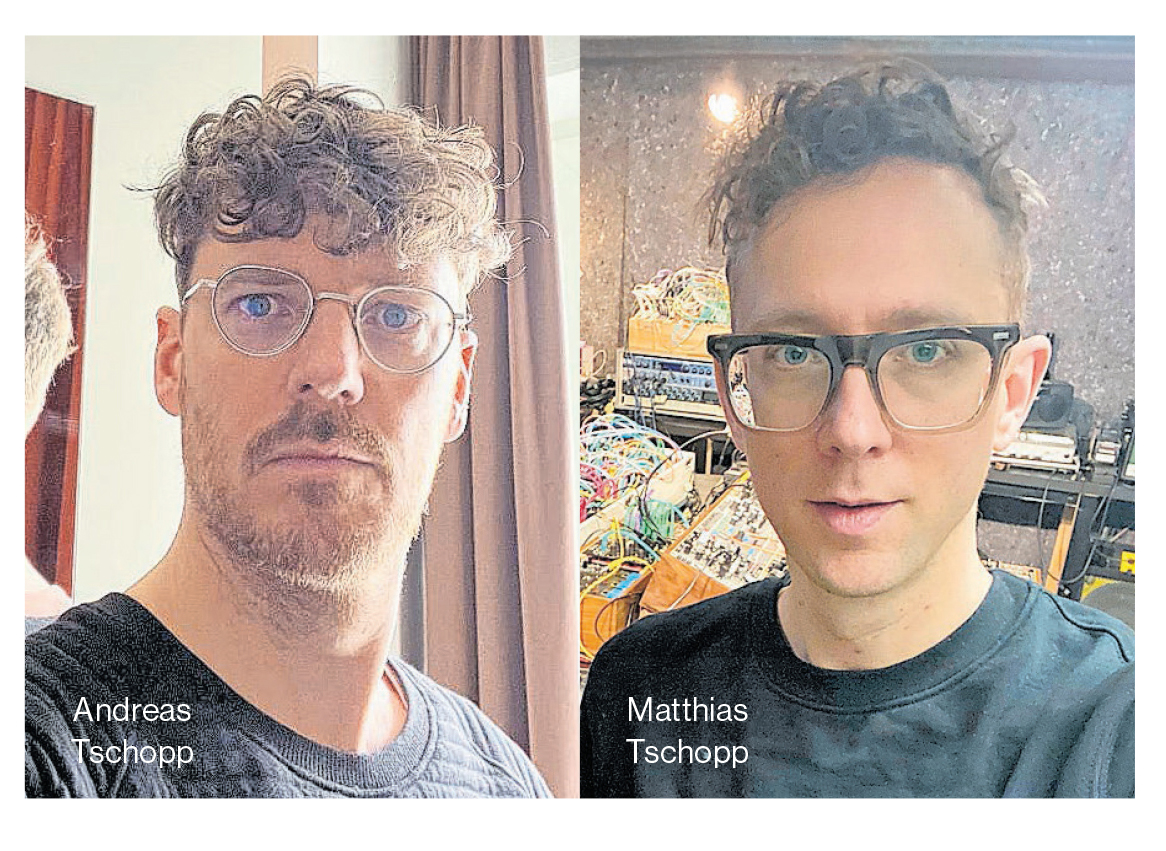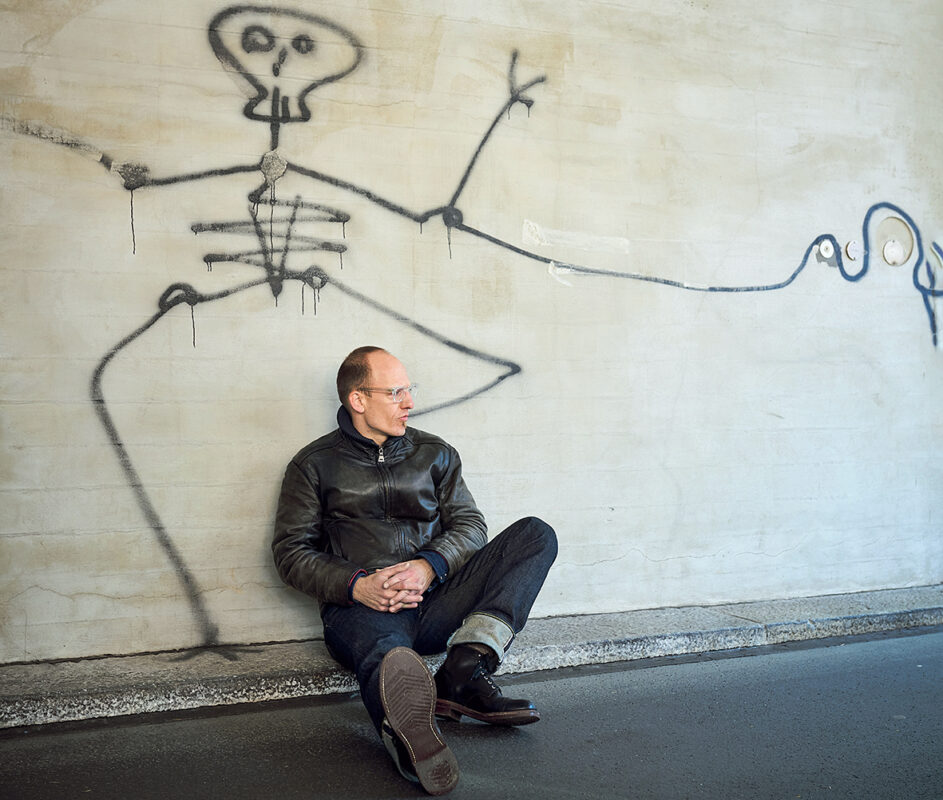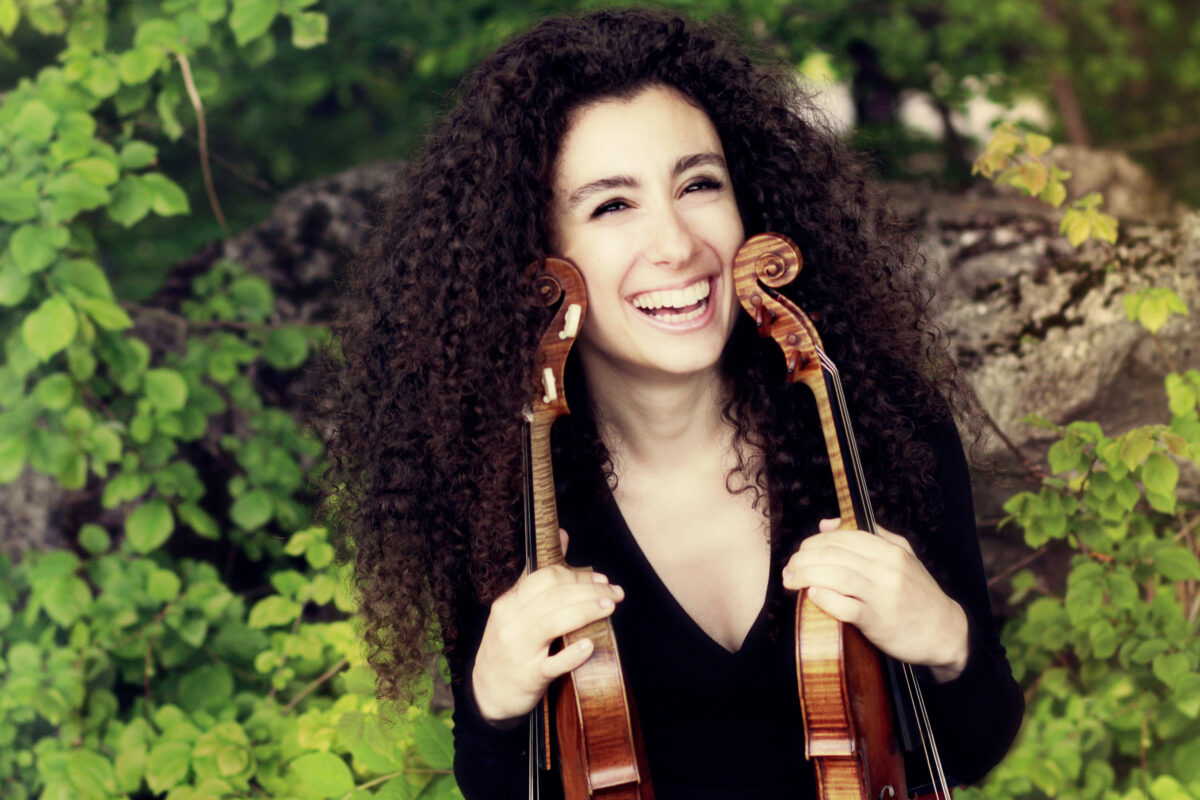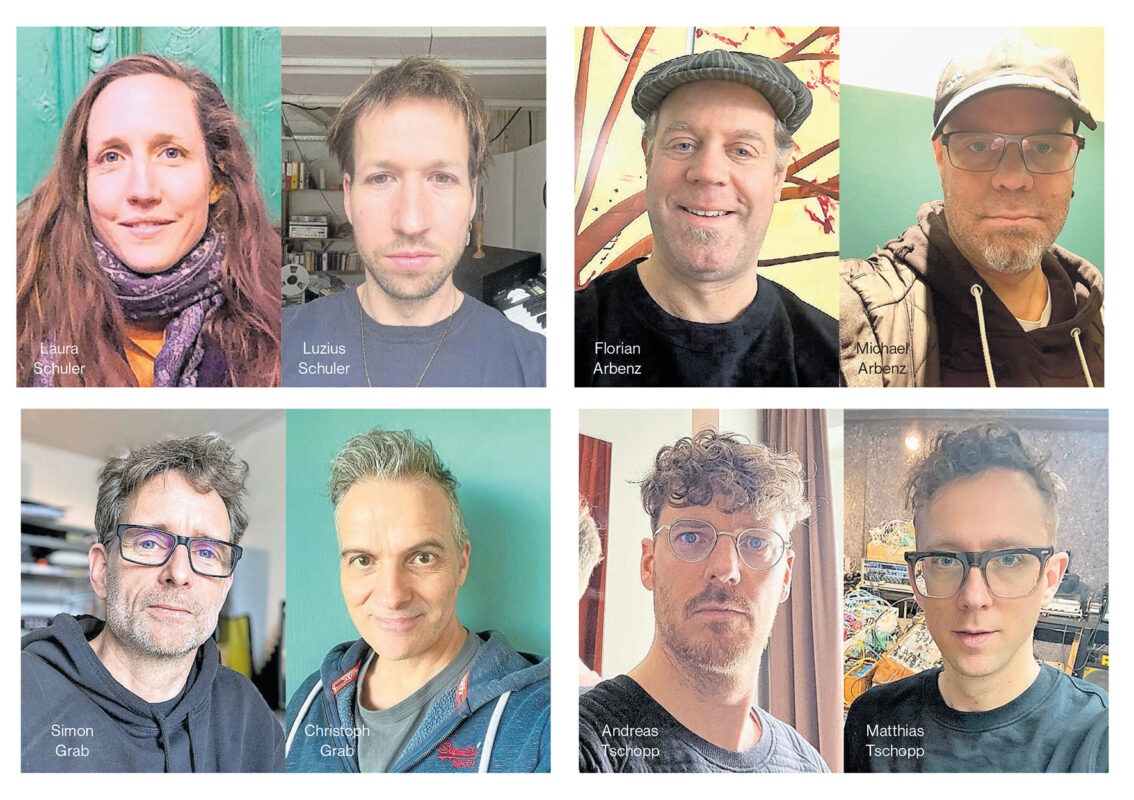Matthias & Andreas Tschopp
Matthias, 1983, baritone saxophone
Andreas, 1979, trombone

Hanspeter Künzler: How did you grow up?
ANDREAS Music was not a huge presence in the household. The parents did play instruments, but very irregularly. My mother played the flute a little, my father the piano.
Andreas, how did you get into the trombone?
ANDREAS I don't remember exactly. Apparently, according to my mother, when we were still living in Zurich, when I was 5 or 6, we went to a Dixieland concert somewhere, open air, and then I said I wanted to learn the trombone. Somehow I was impressed without knowing why. In Rapperswil, where we then moved to, there was no trombone teacher at all. And because the desire remained and was intense, the music school hired a trombone teacher with whom I was the only pupil for years. I have the feeling it has to do with the sound, it's so malleable, close to the voice. You can play a lot with the timbre. I started playing in bands as a teenager. When I thought about studying music, I first went to conservatory and studied classical music. After graduating from high school, I went to California for eight weeks in the summer and enrolled on a course at Berkeley just out of curiosity. That was great, so I changed the whole plan. It was super cool to immerse myself in the world of improv and jazz - to feel the freedom of what you can do on the instrument.
Matthias, the first sentence on your homepage reads: It is widely known that baritone saxophone is the most beautiful of all instruments. What was your career like?
MATTHIAS I first had piano lessons in the 5th or 6th grade. Then I didn't get on so well with the teacher and there was someone in the class who played sax, I thought he was really cool, so I had either sax or electric guitar on my list. It was the 90s and there was a real boom for sax. We had student ensembles and there were always quite a lot of sax players, and later in the Kanti there were even more than enough. Not so today. In my memory, there was either a sax or an electric guitar solo in every second song back then. It's not like that anymore. You hardly ever find a sax in the hit parade anymore.
Why the interest in jazz?
MATTHIAS Jazz was much more present in everyday life back then. That also came from Andreas. But we were always a bit out of sync. When I went to a new school, he had just moved on. But I remember in the evening, when I had to go to bed, I could hear him practising the trombone next door. I found my time in the Kanti big band in Wattwil very formative. When I started there, Andreas had already left. He provided me with exciting music and also worked at Musik Hug for a while. I then copied his CDs onto mini-discs for myself. The Gymi Wattwil had a large catchment area from Wil to Rapperswil. With so many pupils, it was possible to run a fantastic orchestra and a big band. There was a lot of music there, and there still is.
Away from a center like Zurich or even London, were you perhaps a little freer from the trend pressures you are exposed to there?
ANDREAS That could be the case, yes. It was more about the community of people you met there and the exchange. External influences were therefore less important, I have the feeling in retrospect.
Was it the baritone sax for you right from the start?
MATTHIAS No, I started out playing alto saxophone. But all the places in the Kanti band were already taken, so I had to start "at the bottom". In my first year at the jazz school, I switched because I realized that I enjoyed it much more. For a long time I thought that the instrument was too heavy for me. I actually had back problems from lugging it around, but that somehow subsided. Anyway, I hardly ever listened to alto sax at home, only tenor sax. But I didn't feel like playing it. In my eyes, it was always associated with a kind of macho attitude that didn't appeal to me at all. Today I really like playing tenor. On the other hand, with alto sax I never really knew where to go with the sound. My brother put me on the right track: when I told him about my sound crisis again, he said why not bari sax? It was so cool and nobody was doing it? I went to the media library and collected all the bari sax CDs they had, about ten, and found them all great at home. I switched immediately. And I was at peace with alto sax again.
What were the first sax things you appreciated as a 12-year-old?
MATTHIAS Maceo (Parker) and stuff like that. Andreas was 16, had a funk band, they played stuff in that style, Parliament too, plus his own songs. Of course, we kids thought it was really cool that his brother had a band like that, and we listened to that music too. When I was 16 or 17, I listened to a lot of Miles, Coltrane and Cannonball. During that time, I did an exchange year in Guatemala. It was a musical desert, there was no one there with whom I could have exchanged ideas - apart from a German exchange student who I was lucky enough to meet every weekend. I got to know Guatemalan musicians through him and we made music with them every weekend. He had about 15 copies from the Real Book-series (by Hal Leonard), and we played the pieces up and down. I had 20 minidiscs with me. I just remembered that the other day. John Coltrane, The Night With a Thousand EyesI've heard that about a hundred times. During my time in Guatemala, I practiced endlessly out of sheer boredom. I arrived there and after a month the school had a three-month vacation. There were six siblings in the host family and they all sat in front of the TV all day. I would just stay in my room and play. There were moments when I was amazed that they didn't say: Stop it!
Didn't your parents protest when it became clear that you were heading for a future in a breadwinning job, namely bari sax and trombone?
ANDREAS On the contrary. Our job was still normal. The third brother does weird things, he's a paleontologist. Our parents were very supportive. Our father was already very into music. He may not have played that much himself, but he listened to a lot of music. They were very supportive of us learning instruments. For a while, we each learned two different instruments. They must have spent an incredible amount of money on it.
MATTHIAS And drove us to every rehearsal! We were the biggest contributors to our music school. I think Emanuel even played three instruments for a while. They didn't even charge us for certain lessons anymore. Our mother, who was a kindergarten teacher, was also very artistic and creative. We were allowed to have many hobbies. Music and Scouting stayed with us. Almost all of my best friends were in the Scouts and made music.
Have you already played together as brothers?
MATTHIAS In the Kanti big band for the first time, actually. You'd already left, but every now and then you came to help out because they didn't have enough trombones.
ANDREAS That was relatively late, I was 20. 4 ½ years difference in age at that time is quite a lot. If only because of the different technical level.
When did the first band come together?
ANDREAS We kept coming back together, even professionally. The first project as a small band was the trio with Rainer Tempel, the long-time director of the Zurich Jazz Orchestra, a pianist and composer, who put the band together. It was called Ersatzbrüder. He had two brothers, older and younger, who weren't musicians, and with us it was the other way around. Hence the name. But he composed the whole repertoire. There was a lot to read.
The text about the band Sparks and Tides on Bandcamp says that they are a band that unites yin and yang. This of course begs the question - are you yin and yang?
MATTHIAS There are areas where we complement each other. But in many areas, we're very similar. There may be things that one of us is better at and things that the other is better at. But I think if we didn't have a lot of similar interests and things in common, we wouldn't have made a band together. We sat together and thought about the direction the sound and the people should take and we agreed very quickly. If our interests were too different or too opposed, we would have continued to have separate bands.
Doesn't family ballast get in the way of discussions from time to time?
ANDREAS I wouldn't say so. You can tell that the starting point is quite similar, where we find access and where not. I've never found it complicated.
The sign of a positive, constructive family life?
MATTHIAS We had a lot of that. It was a very happy, positive environment - not just the family, but also our peer group and the musical environment. I didn't see any competitive attitudes that tended towards the negative until I went to university.
Competing that Andreas comes along in a Porsche and you're jealous, that's never happened?
BOTH: (laughing merrily)
MATTHIAS No, I totally begrudge Andreas his Porsche. I have my camper instead, it's all good, haha! Something else about yin and yang, we're talking about the band name now. I'm perhaps more the one who is bubbling over with ideas at the moment, and Andreas is more the one who studies a bit longer. I'm just doing blah blah blah, he waits 5 seconds and then maybe comes up with something that has a bit more substance. I find that very enriching when composing. Sparks, the flickering electronics, and Tides, the wide arcs and acoustic tides, that's what the name is all about. In that sense, it's yin and yang. Character traits from which we try to bring together synergies so that everyone can act and contribute from their best zone.
Has your goal or motivation or direction of interest changed in the last fifteen years or is what you are doing now the realization of something you have always wanted?
ANDREAS A bit of both. It's realization in the sense that I've always found it fascinating when people who realize their own projects develop their own musical vision in such a way that it can be put on stage and co-created by other musicians. Being a kind of musical motor and not "just", let's say, interpreting the music of others. I started late, played along a lot before, but only wrote my own stuff later. I always wanted to do it, but only started to realize it shortly after 30. Now it's becoming more and more broad and deep. I'm interested in different projects with different sounds. Always something that grows out of a certain constancy of activity. We haven't reinvented the world or thrown it overboard. But you need that feeling of rediscovery - that you can cultivate it.
A quintet with two trombones and gamelan influences (the band Andreas Tschopp Bubaran) is not necessarily something that immediately springs to mind.
ANDREAS Exactly, I'm interested in such different worlds of sound. I find gamelan extremely fascinating. And I founded the band to have a way of somehow integrating elements of these other sounds, of other tunings and other types of intervals, into my musical life. My projects are always very much about sound. Sparks and Tides also came about in this way, actually. The question was: How should the band sound together? Acoustic? Electronic? A mix? Which instruments? Who has the kind of sound we hear here?
What about your goals and motivation, Matthias?
MATTHIAS I've always had the urge to let my creativity out somewhere, to get something off the ground, and this has been demonstrated time and again in various projects. The first major project was the Miró project. Later, other things too, until the point came when I thought: I'd really rather do something where I'm not alone. With the previous bands, I always had to do everything on my own. I thought: If new projects, then only with people who are a lot of fun to hang out with. That was also the motivation to sit down with Andreas and see if we could do something.
What projects are you involved in today?
ANDREAS Sparks and TidesThe common thing, we're always active with that at the moment. It takes a few months to play until we have stuff again, but the creative process is always ongoing. Otherwise: with my South African-Swiss band Skyjack, which has been around for 10 years now, the third album is coming out in a week, we're on tour in Germany and Switzerland in February and in South Africa in May. The two continents come together in the band. It's the first album where I play the kudu horn. It's an antelope horn, a traditional instrument for signals actually, you can only play 2 or 3 pitches. I bought six and drilled holes in some of the fingers so I can play riffs. It's a new sound source that I enjoy. That - and then from my own stuff is the Vertigo Trombone Quartet, also a collective with three trombones and a bass trombone. One album is finished and we'll be on tour in the fall. All the musicians involved compose their own pieces. And another band that has been around for ages, for 15 years, Le Rex. Four wind players and drums. I also work one day a week at the Lucerne University of Music.
MATTHIAS Sparks and Tides! Then the multimedia trio with Elena Morena Weber and Jürg Zimmermann evolved into the duo It's Me? with Jürg, where we both also play modular synthesizers. I would love to do something with my quartet again, but I don't have the time. Last year we gave a concert after not playing for four years ... (Miró project, at the request of the Paul Klee Center in Bern ...). I teach two days at the music school in Zug.
Can you think of anything else about the brothers' music-making?
ANDREAS We are often confused with each other ...
MATTHIAS I was even offered a trombone job in a big band once ...








